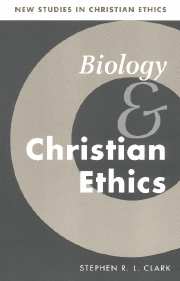Book contents
- Frontmatter
- Contents
- General editor's preface
- Preface
- Introduction
- 1 The development of Darwinian theory
- 2 Moral and metaphysical assumptions
- 3 Trying to live in nature
- 4 The biology of sin
- 5 Human identities
- 6 The goals of goodness
- 7 The end of humanity
- 8 The covenant with all living creatures
- 9 Conclusion: cosmos and beyond
- Index
Introduction
Published online by Cambridge University Press: 02 December 2009
- Frontmatter
- Contents
- General editor's preface
- Preface
- Introduction
- 1 The development of Darwinian theory
- 2 Moral and metaphysical assumptions
- 3 Trying to live in nature
- 4 The biology of sin
- 5 Human identities
- 6 The goals of goodness
- 7 The end of humanity
- 8 The covenant with all living creatures
- 9 Conclusion: cosmos and beyond
- Index
Summary
It has been an axiom for Christian anthropologists (that is, for Christians reasoning about human nature) that human beings are animals of a peculiar kind: ‘spiritual amphibia’ who are the meeting point of ‘merely biological’ and ‘merely angelic or intellectual life’. It has also been axiomatic that human beings were particularly important to God, and that their appearance in the world was by special creation (even if that did not take place as literal-minded readers of the Book of Genesis might suppose). Many Christian thinkers have also placed great stress on ‘natural law’, which is what ‘nature has taught all creatures’, as the basis for moral exploration. All these ideas have been called into question by recent biological theory and observation. It may be that some of them, and some related concepts (e.g. species essentialism), need to be abandoned; others need only to be reformulated, and a few need merely to be reasserted against the errors of our age.
Some writers have suggested that none of this is true: ‘science’ and ‘religion’, it is said, have entirely different provinces and operate by entirely different rules. Nothing about our biological history and nature, so they say, has any relevance to any ‘religious’ claim: science deals with ‘facts’ and religion only with ‘values’. That claim is not unreasonable, though I believe it to be false; but if there is such a distinction, that itself demands a rigorous reformulation of traditional Christian discourse.
- Type
- Chapter
- Information
- Biology and Christian Ethics , pp. 1 - 8Publisher: Cambridge University PressPrint publication year: 2000



